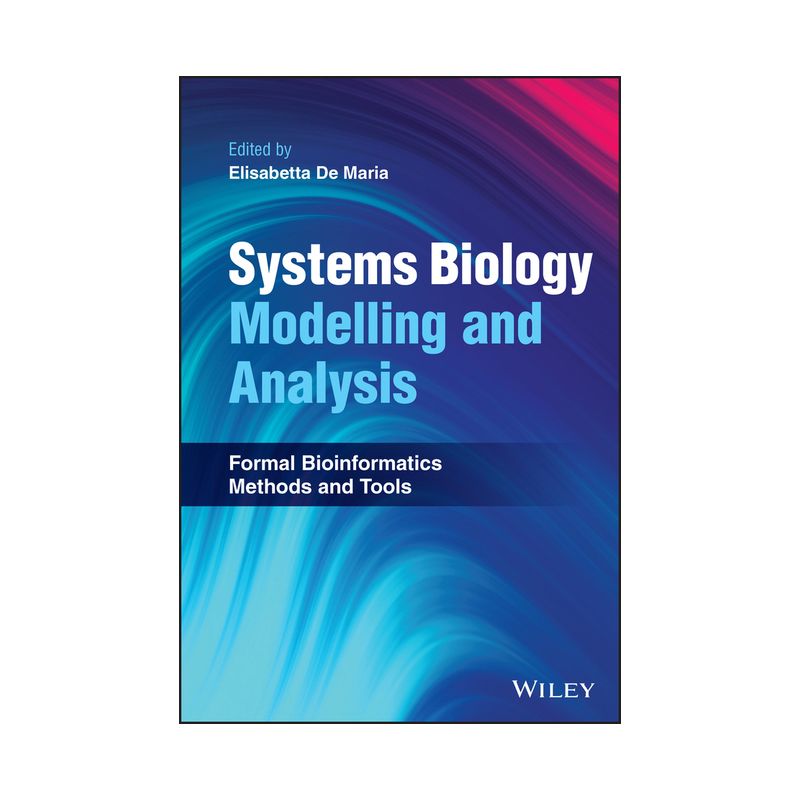Sponsored
Systems Biology Modelling and Analysis - by Elisabetta de Maria (Hardcover)
Sponsored
About this item
Highlights
- Systems Biology Modelling and Analysis Describes important modelling and computational methods for systems biology research to enable practitioners to select and use the most suitable technique Systems Biology Modelling and Analysis provides an overview of state-of-the-art techniques and introduces related tools and practices to formalize models and automate reasoning for systems biology.
- About the Author: Elisabetta De Maria, PhD, is an Associate Professor at the Université Côte d'Azur.
- 464 Pages
- Science, Life Sciences
Description
About the Book
"Systems biology combines biological, mathematical, computational, and physical sciences in order to analyze, model, and create biological systems. To this end, biological knowledge is often extracted from high-throughput "omics" (genomics, transcriptomics, proteomics, metabonomics, etc.) data that is generated via next-generation molecular technologies. The core of systems biology consists in turning data into networks to which we want to give a dynamic This book overviews state-of-the-art techniques, and introduces related tools and practices, to formalize models and automate reasoning for systems biology. The authors present and compare the main formal methods used in systems biology for modelling biological networks, including discussion of their advantages / drawbacks and main applications. Among the methods covered are Boolean networks, systems biology markup language (SBML), linear logic, differential equations, and automata"--Book Synopsis
Systems Biology Modelling and AnalysisDescribes important modelling and computational methods for systems biology research to enable practitioners to select and use the most suitable technique
Systems Biology Modelling and Analysis provides an overview of state-of-the-art techniques and introduces related tools and practices to formalize models and automate reasoning for systems biology. The authors present and compare the main formal methods used in systems biology for modelling biological networks, including discussion of their advantages, drawbacks, and main applications.
Each chapter includes an intuitive presentation of the specific formalism, a brief history of the formalism and of its applications in systems biology, a formal description of the formalism and its variants, at least one realistic case study, some applications of formal techniques to validate and make deep analysis of models encoded with the formalism, and a discussion on the kind of biological systems for which the formalism is suited, along with concrete ideas on its possible evolution.
Edited by a highly qualified expert with significant experience in the field, some of the methods and techniques covered in Systems Biology Modelling and Analysis include:
- Petri nets, an important tool for studying different aspects of biological systems, ranging from simple signaling pathways to metabolic networks and beyond
- Pathway Logic, a formal, rule-based system and interactive viewer for developing executable models of cellular processes
- Boolean networks, a mathematical model which has been widely used for decades in the context of biological regulation networks
- Answer Set Programming (ASP), which has proven to be a strong logic programming paradigm to deal with the inherent complexity of biological models
For systems biologists, biochemists, bioinformaticians, molecular biologists, pharmacologists, and computer scientists, Systems Biology Modelling and Analysis is a comprehensive all-in-one resource to understand and harness the field's current models and techniques while also preparing for their potential developments in coming years with the help of the author's expert insight.
From the Back Cover
Describes important modelling and computational methods for systems biology research to enable practitioners to select and use the most suitable technique
Systems Biology Modelling and Analysis provides an overview of state-of-the-art techniques and introduces related tools and practices to formalize models and automate reasoning for systems biology. The authors present and compare the main formal methods used in systems biology for modelling biological networks, including discussion of their advantages, drawbacks, and main applications.
Each chapter includes an intuitive presentation of the specific formalism, a brief history of the formalism and of its applications in systems biology, a formal description of the formalism and its variants, at least one realistic case study, some applications of formal techniques to validate and make deep analysis of models encoded with the formalism, and a discussion on the kind of biological systems for which the formalism is suited, along with concrete ideas on its possible evolution.
Edited by a highly qualified expert with significant experience in the field, some of the methods and techniques covered in Systems Biology Modelling and Analysis include:
- Petri nets, an important tool for studying different aspects of biological systems, ranging from simple signaling pathways to metabolic networks and beyond
- Pathway Logic, a formal, rule-based system and interactive viewer for developing executable models of cellular processes
- Boolean networks, a mathematical model which has been widely used for decades in the context of biological regulation networks
- Answer Set Programming (ASP), which has proven to be a strong logic programming paradigm to deal with the inherent complexity of biological models
For systems biologists, biochemists, bioinformaticians, molecular biologists, pharmacologists, and computer scientists, Systems Biology Modelling and Analysis is a comprehensive all-in-one resource to understand and harness the field's current models and techniques while also preparing for their potential developments in coming years with the help of the author's expert insight.
About the Author
Elisabetta De Maria, PhD, is an Associate Professor at the Université Côte d'Azur. From 2011-13, she was Coordinator of the International Research Master Program "Computational Biology and Biomedicine" at the University of Nice-Sophia Antipolis. Dr. De Maria has expertise in bioinformatics and computational systems biology and served as program chair of the conferences BIOINFORMATICS 2019, CSBio 2019 (International Conference on Computational Systems-Biology and Bioinformatics), and BIOINFORMATICS 2020.
Additional product information and recommendations
Sponsored
